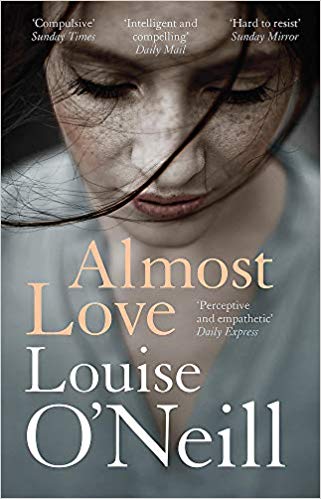 Although I generally review only YA books here, I’m making an exception this week. Not because it’s St. Patrick’s Day and this book is by an Irish writer, but because Louise O’Neill is one of my favorite authors even though she hasn’t written that many books—I’ve read her other three, all of which are YA (and all of which I’ve reviewed here). Almost Love is about a woman in her mid-twenties and almost has the feel of New Adult, but not quite.
Although I generally review only YA books here, I’m making an exception this week. Not because it’s St. Patrick’s Day and this book is by an Irish writer, but because Louise O’Neill is one of my favorite authors even though she hasn’t written that many books—I’ve read her other three, all of which are YA (and all of which I’ve reviewed here). Almost Love is about a woman in her mid-twenties and almost has the feel of New Adult, but not quite.
O’Neill is clearly great at creating main characters who aren’t really likable but who you still care about, as she does this in Almost Love like she did in Asking for It. Almost Love tells two parallel stories from Sarah’s life—one when she twenty-four and another three years later. In the “then” timeline, she’s recently graduated from Dublin Art College and is living with some of her buddies from school, including Fionn, who’s basically her best friend in Dublin. She’s from the Tipperary area and has friends back there, but she hardly ever goes home. Fionn is already becoming a semi-famous up-and-coming artist in Ireland and Sarah feels inferior and never works on her art anymore. She’s teaching school art and is still in the party mindset. But then she meets a student’s father and soon they begin a relationship that is doomed from the start, even though she doesn’t see it.
In the “now” timeline, she’s living with her boyfriend Oisín, who’s mother is a very famous and rich artist. Sarah’s still friends with Fionn but we know that she did something horrible in the earlier timeline that has strained their relationship. She also is still unable to make any art even though she’s still teaching it. Sarah was happy with Oisín in the beginning but there are seeds of trouble now and it’s not clear how things will go.
Sarah really isn’t a nice person. She’s self-absorbed and a pretty terrible friend and girlfriend. She’s also clearly a little depressed and feeling inferior to the important people around her, so she’s not a great joy to be around for the reader. However, despite all that, I still really wanted to see how things worked out with her. When she becomes obsessed with the student’s father and lets him mistreat her, I kept wondering if she’d finally see how horrible he is or if he would destroy her in the end. And I really hoped things would work out with Oisín because he seems like a really nice guy.
O’Neill is great at getting into her protagonists’ minds, and she does it here, too. We see Sarah change, and not always in a good way, and understand her bad choices even if we’re screaming at her to make different ones. And of course this is a feminist book, with several good lines that I really like. Here are a couple:
Being admired by him didn’t feel like when other men would look at her, teeth bared as if they wanted to devour her. Smile, love, men would shout as she passed them on the street. You’d be so much prettier if you smiled, as if performance of joy was the price Sarah had to pay for existing in a female body in a public space.
and
Maybe men didn’t want women to be funny, not the women they were having sex with anyway. Sarah suspected that men wanted a girlfriend to be ‘fun’, which seemed to mean she should find them funny and laugh at their jokes, never making any of her own.
If you’ve read O’Neill’s other work and like it, you should check this one out. It won’t disappoint. And if you’re new to her but like slightly challenging books, you should try it, too.